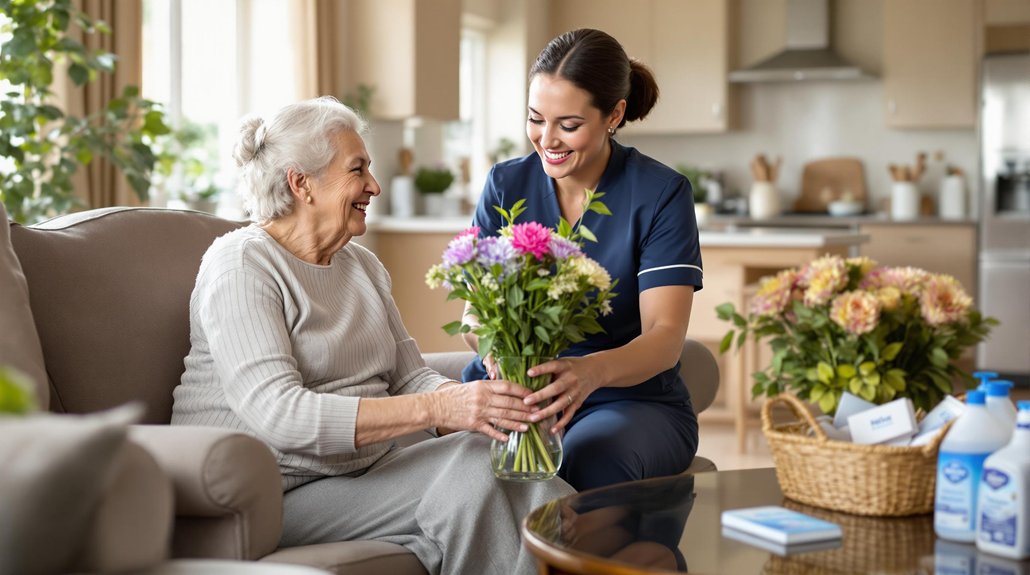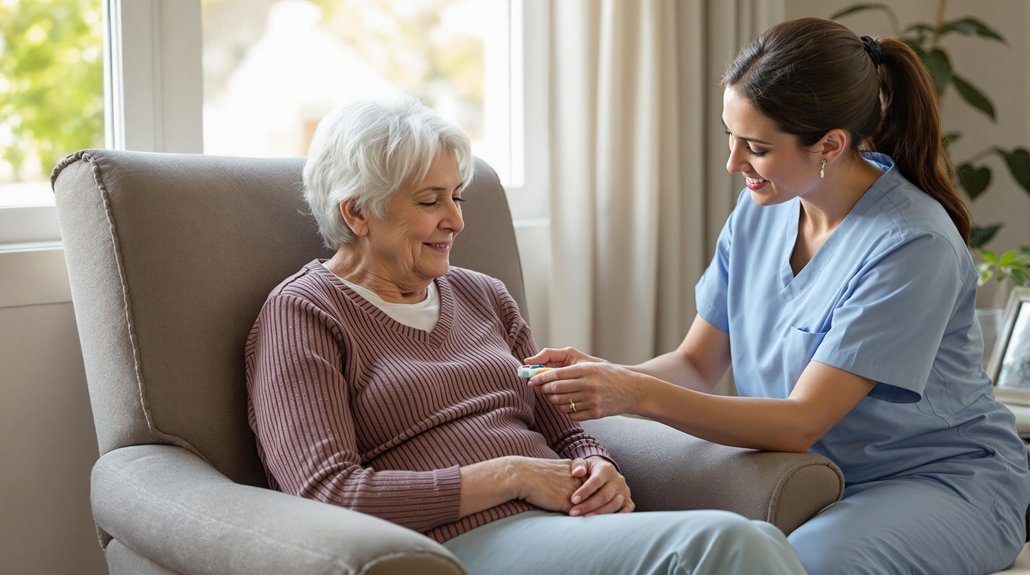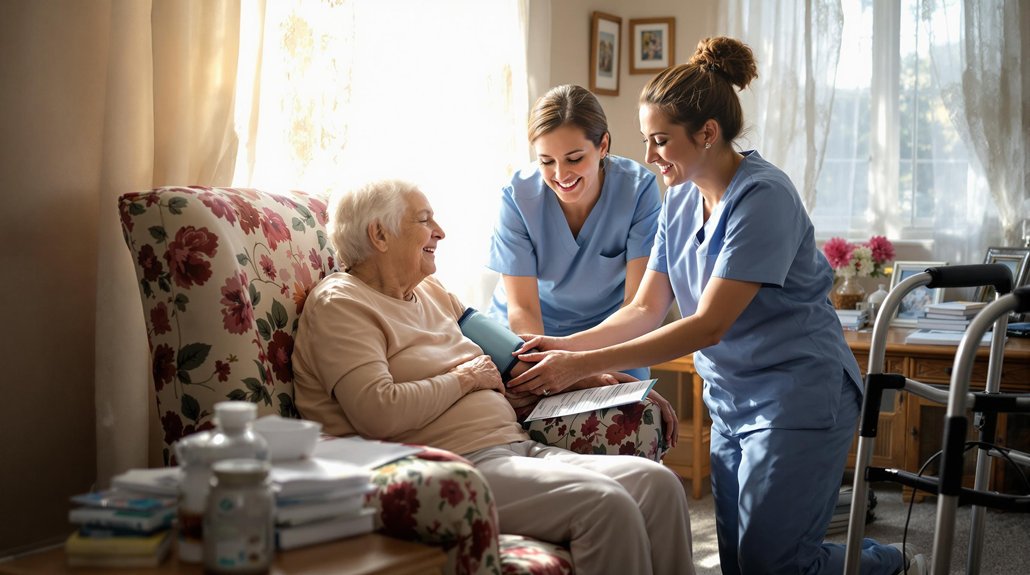A private home caregiver helps you maintain independence while aging comfortably at home. They’ll assist with daily activities like personal hygiene, medication management, meal preparation, and light housekeeping. Your caregiver monitors your health, provides companionship, and coordinates with healthcare providers to guarantee your wellbeing. They’ll handle errands, transportation, and safety checks while keeping detailed care records. Understanding a caregiver’s full scope of duties can help you make informed decisions about your care needs.
Core Responsibilities of Private Home Caregivers
Private home caregivers perform several essential duties to help clients maintain their independence and quality of life while living at home.
You’ll assist with activities of daily living, including personal hygiene, medication reminders, meal preparation, and light housekeeping. Your role also involves monitoring crucial signs and reporting changes in your client’s condition to healthcare providers.
Before beginning care, you’ll participate in a thorough client assessment to understand specific needs and develop an appropriate care plan.
Initial assessments lay the foundation for personalized care, ensuring every client receives services tailored to their unique circumstances and requirements.
You’ll receive caregiver training to properly handle mobility assistance, fall prevention, and emergency responses.
You’ll also provide companionship through conversation, activities, and emotional support.
Transportation assistance for medical appointments and errands may be required, along with maintaining accurate records of daily care activities and observations.
As part of a family-centric approach, you’ll work closely with healthcare professionals to ensure seamless coordination of care services.
Personal Care and Hygiene Assistance
When providing personal care assistance, you’ll help clients maintain proper hygiene and dignity through various essential tasks.
You’ll offer bathroom assistance, helping clients safely use the toilet, shower, or bathe. This includes washing hair, ensuring proper cleansing, and preventing slips or falls.
Your grooming help will cover daily tasks like brushing teeth, shaving, applying moisturizer, and combing hair.
You’ll assist with dressing, helping clients select appropriate clothing and managing buttons, zippers, or other fasteners. For clients with limited mobility, you’ll help them shift between sitting, standing, and lying positions during these activities.
Throughout these intimate care moments, you’ll maintain a respectful, professional demeanor while ensuring your client feels comfortable and respected.
As a qualified caregiver, you’ll develop customized care plans that address each senior’s unique personal care needs and preferences.
Medical Support and Medication Management
Although medication management requires careful attention to detail, you’ll help guarantee clients take their prescribed medications correctly and on schedule. This includes organizing pill boxes, reading prescription labels carefully, and maintaining detailed medication logs to confirm proper medication adherence.
You’ll also provide essential health monitoring by tracking crucial signs, recognizing adverse drug reactions, and reporting any concerning changes to healthcare providers or family members.
Your responsibilities may include scheduling medical appointments, accompanying clients to doctor visits, and helping them understand post-appointment instructions.
Reliable caregivers schedule appointments, attend doctor visits, and ensure clients fully understand their treatment plans and follow-up care.
When working with multiple medications, you’ll need to stay alert for potential drug interactions and maintain clear communication with all healthcare providers involved in your client’s care.
Your diligence in these tasks helps maintain your client’s health and safety.
Working with seniors who have chronic disease management needs requires specialized knowledge of medication protocols for conditions like diabetes and heart disease.
Meal Planning and Nutritional Support
Good nutrition forms an essential foundation for your client’s health and well-being, so you’ll need to understand their dietary requirements and restrictions.
As a caregiver, you’ll play an important role in ensuring proper nutrition while respecting their dietary preferences.
Your responsibilities in meal planning and nutritional support include:
- Creating weekly meal plans that accommodate medical conditions, allergies, and personal tastes while ensuring balanced nutrition
- Shopping for fresh ingredients and maintaining a well-stocked pantry of healthy staples
- Preparing meals that are both nutritious and easy to eat, considering any swallowing difficulties or physical limitations
- Providing basic nutrition education to help your client understand the importance of healthy eating and making informed food choices
You’ll also monitor their food intake and hydration levels, reporting any concerns to healthcare providers.
Working with certified geriatric caregivers ensures proper implementation of dietary requirements for seniors with chronic conditions.
Safety Monitoring and Fall Prevention
Since falls represent one of the greatest risks to elderly and disabled clients, your role in safety monitoring and fall prevention is essential.
You’ll conduct regular safety checks throughout the home, looking for potential hazards like loose rugs, poor lighting, or cluttered walkways. Being vigilant about fall detection means staying alert to your client’s movements and recognizing signs of unsteadiness or fatigue.
You’ll recommend necessary home modifications to family members, such as installing grab bars in bathrooms, improving lighting, or removing tripping hazards.
Your duties include ensuring your client uses mobility aids correctly and wears appropriate footwear. When assisting with transfers or walking, you’ll use proper techniques to support their balance and prevent accidents.
You’ll also document any safety concerns and report them to healthcare providers or family members.
Working alongside skilled healthcare professionals, you may need to coordinate fall prevention strategies when clients are recovering from surgery or managing chronic conditions.
Emotional Support and Companionship
While medical care and physical assistance are essential, your role as a caregiver extends deeply into providing emotional support and companionship.
You’ll create meaningful emotional connections through daily interactions, helping your client maintain a positive outlook and sense of dignity.
To nurture companionship activities and boost your client’s emotional well-being, you can:
- Listen attentively to their stories, concerns, and experiences while offering genuine empathy and understanding
- Engage in shared hobbies like reading, playing cards, or working on puzzles together
- Help maintain connections with family and friends through video calls or letter writing
- Create a warm, positive environment by celebrating small victories and special occasions
Your presence and emotional support help combat loneliness and contribute greatly to your client’s overall quality of life.
Transportation and Errand Services
Beyond emotional support, many clients need help maintaining their independence outside the home. As a private caregiver, you’ll provide essential transportation services to help them stay connected to their community and manage daily tasks.
You’ll drive clients to medical appointments, social gatherings, and religious services, ensuring they arrive safely and on time. Managing appointment scheduling and coordinating with healthcare providers becomes part of your routine.
You’ll also handle grocery shopping, picking up prescriptions, and running other essential errands when clients can’t do these tasks themselves.
For clients who prefer to join you on errands, you’ll assist them in and out of vehicles, help them navigate stores, and carry packages. This support allows them to participate in daily activities while ensuring their safety and comfort.
Documentation and Care Coordination
Maintaining detailed records of care activities forms the backbone of professional caregiving.
You’ll need to track everything from medication schedules to daily routines through thorough care records and communication logs. This documentation guarantees continuity of care and helps coordinate with healthcare providers and family members.
- Document daily activities, including meals, medications, and any changes in your client’s condition.
- Keep detailed communication logs of interactions with family members, doctors, and other healthcare professionals.
- Track appointments, medication refills, and important healthcare deadlines.
- Update care plans regularly to reflect changing needs and new healthcare instructions.
Conclusion
Private home caregivers make a real difference in people’s lives every day. Like Sarah, who helped her elderly client John bounce back after his stroke. She worked with him on his daily exercises, made sure he took the right medicines at the right time, and gave him the emotional support he needed. These caring professionals become like family members, helping their clients live with dignity and joy in their own homes.
Our caregivers don’t just provide basic care – they create warm, supporting relationships that help people thrive. They’re there to share stories, hold hands during tough times, and celebrate small victories together. Whether it’s helping with daily tasks, providing companionship, or giving family members peace of mind, our caregivers bring comfort and stability to every home they enter.
You don’t have to face caregiving challenges alone. If you or a loved one need help, don’t wait. Reach out to Focus Family Care today at (561) 693-1311 or email us at info@focusfamilycare.com.





